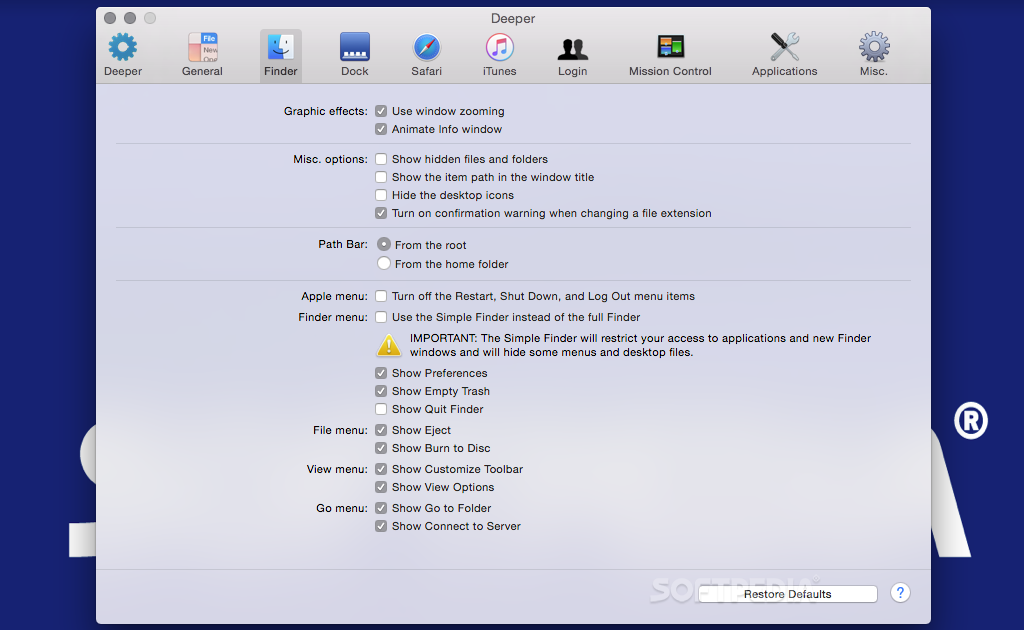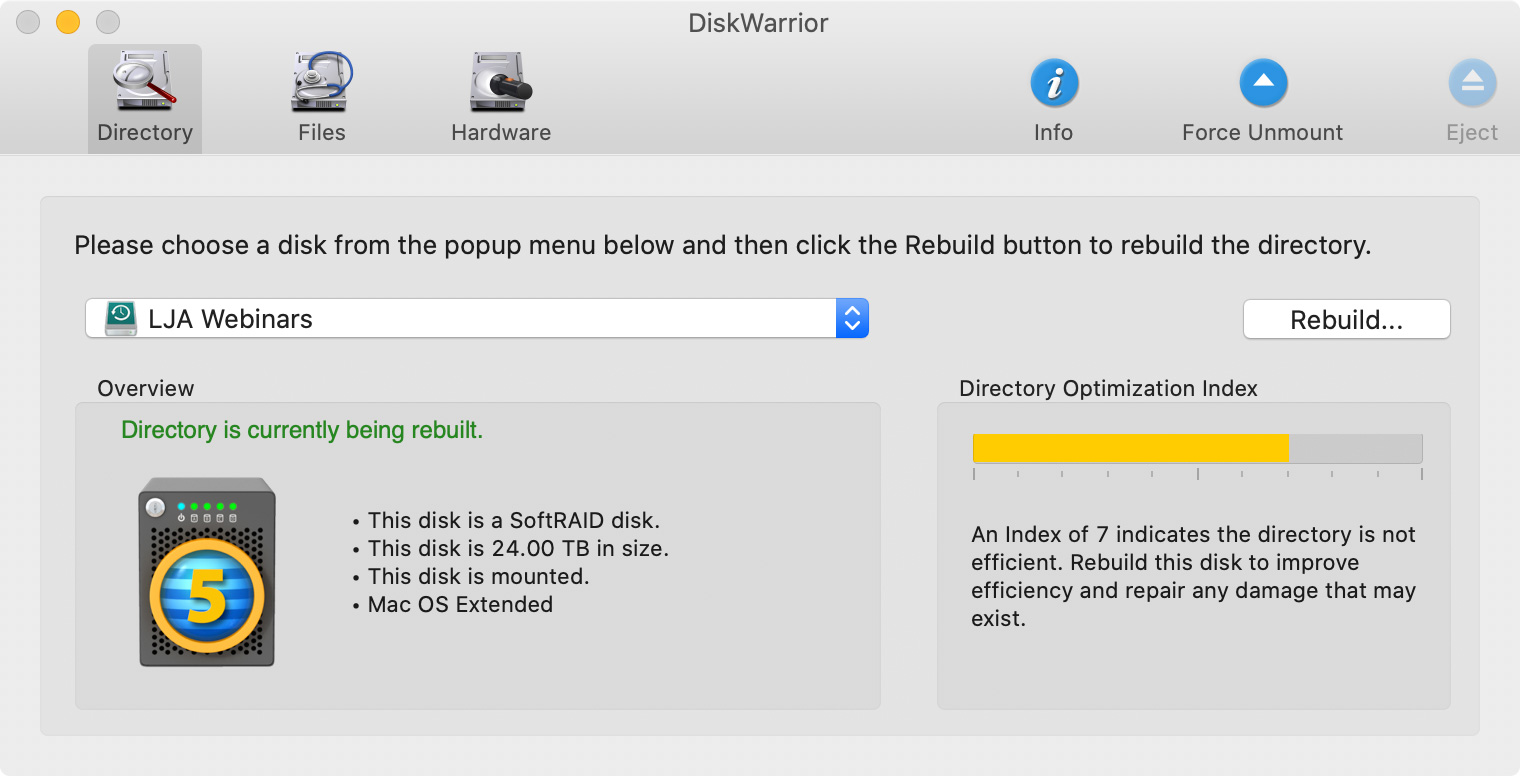Using DiskWarrior 5.2 while started (booted) from High Sierra, Mojave or Catalina.
DiskWarrior5.2Rel2.zip (11.99 MB) Choose free or premium download SLOW DOWNLOAD. FAST INSTANT DOWNLOAD Download type: Free: Premium: Download speed: 0.03 KBps: Maximum: Waiting time: 12 Seconds: Instant. DiskWarrior5.2.zip (24.39 MB) Choose free or premium download SLOW DOWNLOAD. FAST INSTANT DOWNLOAD Download type: Free: Premium: Download speed: 0.03 KBps: Maximum: Waiting time: 12 Seconds: Instant. Free Download Option. DiskWarrior5.2Rel2.zip (11.99 MB) Uploaded on: 2018-10-11 05:53:45: Size: 11.99 MB: Downloaded: 595 times Report abuse: Share this file- Advertising - Download. I agree to the terms when download file Some our other sites that you can take much advantage from. Note: The “Startup Disk” of macOS Big Sur (11.0), macOS Catalina (10.15), macOS Mojave (10.14), and macOS 10.13 High Sierra with SSDs (Solid State Drives) cannot be rebuilt with DiskWarrior as they are automatically pre-loaded with Apple File System (APFS). DiskWarrior 5.2 is NOT fully compatible with macOS 11.0 Big Sur. DiskWarrior Recovery Maker 1.4 is not compatible at all.
What you need to know (Click here for the summary)
1) Apple File System (APFS) disks (typically a macOS 10.14 Mojave or 10.15 Catalina Startup Disk) are recognized but ARE NOT able to be rebuilt by DiskWarrior 5.2. Click here to learn how to identify an APFS disk.
2) Click here to join the Mailing List to be notified of progress regarding Apple File System (APFS) support and updates to DiskWarrior.
3) Mac OS Extended (HFS Plus) disks can be rebuilt as before.
4) The Startup Disk of Macs are automatically converted from Mac OS Extended (HFS Plus) to Apple File System (APFS) when installing or upgrading to macOS 10.14 Mojave or macOS 10.15 Catalina. Only internal SSD drives are converted to APFS by macOS 10.13 High Sierra.
5) External drives are not automatically converted to Apple File System (APFS). Your Mac OS Extended external drives can be rebuilt as before.
6) DiskWarrior 5.2 is compatible with macOS 10.13 High Sierra, macOS 10.14 Mojave and macOS 10.15 Catalina when rebuilding Mac OS Extended external drives.

7) DiskWarrior 5.2 now runs within macOS 10.14 Mojave and macOS 10.15 Catalina Recovery.
8) The Preview application in DiskWarrior can now copy files to APFS disks when recovering data from a failing Mac OS Extended (HFS Plus) disk.
9) Numerous minor updates were made to accommodate additional security measures in macOS 10.14 Mojave and macOS 10.15 Catalina.
10) To rebuild Time Machine disks in macOS 10.14 Mojave and macOS 10.15 Catalina, DiskWarrior must be given “Full Disk Access” from within System Preferences. Otherwise, they can be be rebuilt from macOS Recovery or the DiskWarrior Recovery flash drive.
The following applies only when running an installed copy of DiskWarrior from within macOS 10.13 High Sierra, macOS 10.14 Mojave and macOS 10.15 Catalina; not when booted from the DiskWarrior flash drive or macOS Recovery.
11) Due to the ever enhancing security of macOS you might need to first 'Allow' the system extension portion of DiskWarrior to be loaded on your Mac. The first time you launch DiskWarrior 5.2, the system extension might be blocked. You will only need to allow the system extension once.
Follow the instructions in the System Extension Blocked message to allow the DiskWarrior system extension software to be loaded. Open the Security & Privacy System Preference and click the lock and then click the Allow button.
Quit DiskWarrior, reboot your Mac and launch DiskWarrior again.
Click here for a step-by-step video guide on installing DiskWarrior 5.2 in these newer versions of macOS.
What's in the works
The next major release of DiskWarrior will include the ability to rebuild APFS disks. Apple released a portion of the APFS format documentation in September of 2018 . Our developers are now waiting for the remaining portion of documentation to update DiskWarrior in order to safely rebuild Apple File System (APFS) disks.
Using DiskWarrior Recovery Maker 1.4.
What you need to know

1) DiskWarrior Recovery Maker 1.4 is compatible with macOS 10.14 Mojave and macOS 10.15 Catalina. You will need DiskWarrior 5.2 to run DiskWarrior from a recovery flash drive created while running macOS 10.14 Mojave or macOS 10.15 Catalina. Creating a 10.14 or 10.15 recovery flash drive will not allow DiskWarrior to rebuild APFS (Apple File System) disks.
2) An extra step is needed to create a DiskWarrior startup recovery flash drive on an iMac Pro, late 2019 Mac Pro, a mid-2018/2019 MacBook Pro, late-2018 / mid-2019 MacBook Air or a late-2018 Mac mini. These 4 Macs are equipped with Secure Boot via Apple’s T2 Security Chip. By default, Secure Boot does not allow starting up from an external disk such as a DiskWarrior recovery flash drive. Also by default, Secure Boot prevents the creation of a macOS startup disk except for those created using Apple's Installer.
To create and use a DiskWarrior Recovery disk for Macs with Secure Boot, it will be necessary to change the default Secure Boot and External Boot settings using the Startup Security Utility. The Secure Boot setting will need to be changed to Medium Security or No Security. Alsoft recommends Medium Security. Additionally, the External Boot setting will need to be changed to Allow booting from external media.
Please follow the instructions found on Apple's web site using the following link to make the needed changes.
Notice: Creation of, or start up from, a DiskWarrior recovery flash drive will fail if the above steps are not taken.
Didn't read all of the above? At least read this summary:
1) DiskWarrior 5.2 is compatible with High Sierra, Mojave and Catalina when rebuilding external Mac OS Extended disks.
2) Your external drives (including Time Machine Volumes) can be rebuilt as before.
3) The Startup Disk of Macs are converted to APFS (Apple File System) when installing or upgrading to macOS 10.14 Mojave, macOS 10.15 Catalina or macOS 10.13 High Sierra (High Sierra only converts internal Solid State Drives (SSD/Flash).
4) APFS (Apple File System) disks ARE NOT able to be rebuilt. Click here to learn how to identify an APFS disk.
5) In Mojave and Catalina, Time Machine disks cannot be rebuilt with DiskWarrior unless DiskWarrior is given “Full Disk Access” from within the Security pane of System Preferences. Otherwise Time Machine disks must now be rebuilt from macOS Recovery or the DiskWarrior Recovery Flash drive.
Diskwarrior 5.2 Free Download
6) The next major release of DiskWarrior will include the ability to rebuild APFS disks.
7) Click here to join the Mailing List to be notified of progress regarding Apple File System (APFS) support and updates to DiskWarrior.
Updating to DiskWarrior 5.2 and DiskWarrior Recovery Maker 1.4.
1) A free updater is available for owners of DiskWarrior 5.0 and 5.1.
Diskwarrior 5.2 Catalina
2) The updater will replace the DW partition on the DiskWarrior flash drive. The updated flash drive will contain DiskWarrior 5.2 and DiskWarrior Recovery Maker 1.4.
3) The updater will also update any installed copy of DiskWarrior 5.0 or 5.1 that is located in the Applications folder.
4) The updater will also update DiskWarrior 5.0 or 5.1 that is located on any attached DiskWarrior recovery flash drives that were created with earlier versions of DiskWarrior Recovery Maker.
5) Click here to download the combo DiskWarrior 5.2 and DiskWarrior Recovery Maker 1.4 updater.
6) Click hereto download the standalone DiskWarrior Recovery Maker 1.4 updater.
Note: The “Startup Disk” of macOS Big Sur (11.0), macOS Catalina (10.15), macOS Mojave (10.14), and macOS 10.13 High Sierra with SSDs (Solid State Drives) cannot be rebuilt with DiskWarrior as they are automatically pre-loaded with Apple File System (APFS).
DiskWarrior 5.2 is NOT fully compatible with macOS 11.0 Big Sur. DiskWarrior Recovery Maker 1.4 is not compatible at all. Updates for full compatibility are coming soon. Please visit the DiskWarrior Compatibility with macOS 11 Big Sur page for more information.
If you have an earlier version of DiskWarrior, learn about the new features of DiskWarrior 5 and how to upgrade by clicking here.
Please note that to install DiskWarrior 5 onto your start up disk, your Mac must start up in Mac OS X 10.5.8 Leopard through macOS 10.15 Catalina. Please read the system requirements for DiskWarrior 5.
Click herefor important DiskWarrior 4 compatibility news and support.
Click here for important DiskWarrior 3 compatibility news and support.
Click here for important DiskWarrior 2 compatibility news and support.
DiskWarrior now ships on a flash drive instead of DVD. If you plan to rebuild the directory of your startup disk, you need to start up from another disk capable of starting up in Mac OS X 10.5.8 Leopard through macOS 10.15 Catalina, such as the DiskWarrior Recovery flash drive or your Mac's OS X Recovery (the Recovery HD). OS X Recovery is available in OS X 10.7 Lion and later.
Whether started from the DiskWarrior Recovery flash drive, OS X Recovery or another disk, DiskWarrior can run from the flash drive to eliminate all damage to any HFS (Mac OS Standard) and HFS Plus (Mac OS Extended) disk directories, including your normal startup disk.
Click here for step-by-step instructions on starting up from the DiskWarrior Recovery flash drive or OS X Recovery.

The DiskWarrior Recovery flash drive ships with the ability to start up any 64-Bit Intel Mac that currently starts up in Mac OS X 10.4 Tiger, 10.5 Leopard or 10.6 Snow Leopard. If you have a newer Intel Mac, you can use the included DiskWarrior Recovery Maker to update the DiskWarrior Recovery flash drive to start up your newer Mac.
Quick Links:
Mailing List